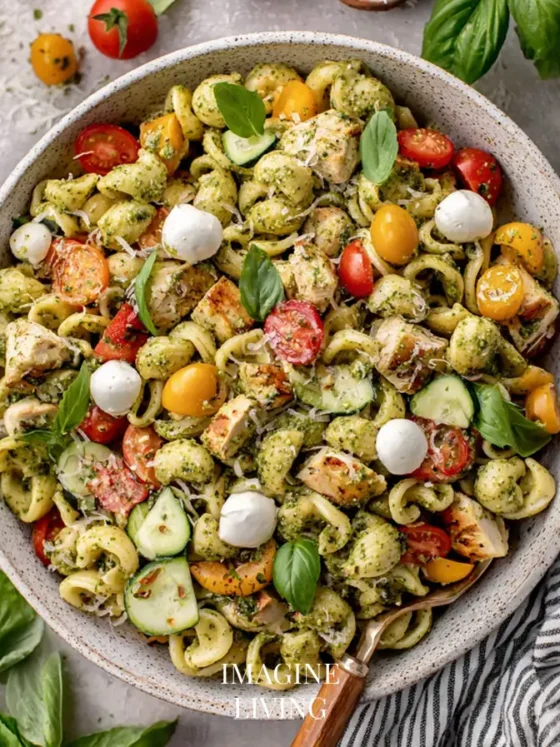Homemade Fresh Basil Pesto: A Burst of Flavor in Every Spoonful
Few things capture the essence of fresh ingredients like homemade basil pesto. The vibrant green color, the rich aroma of basil, and the nutty depth of Parmesan and pine nuts create a sauce that’s as versatile as it is delicious. Whether you’re drizzling it over pasta, spreading it on sandwiches, or using it as a dip, this pesto brings an instant burst of flavor to any dish.
“Cooking is love made visible.”
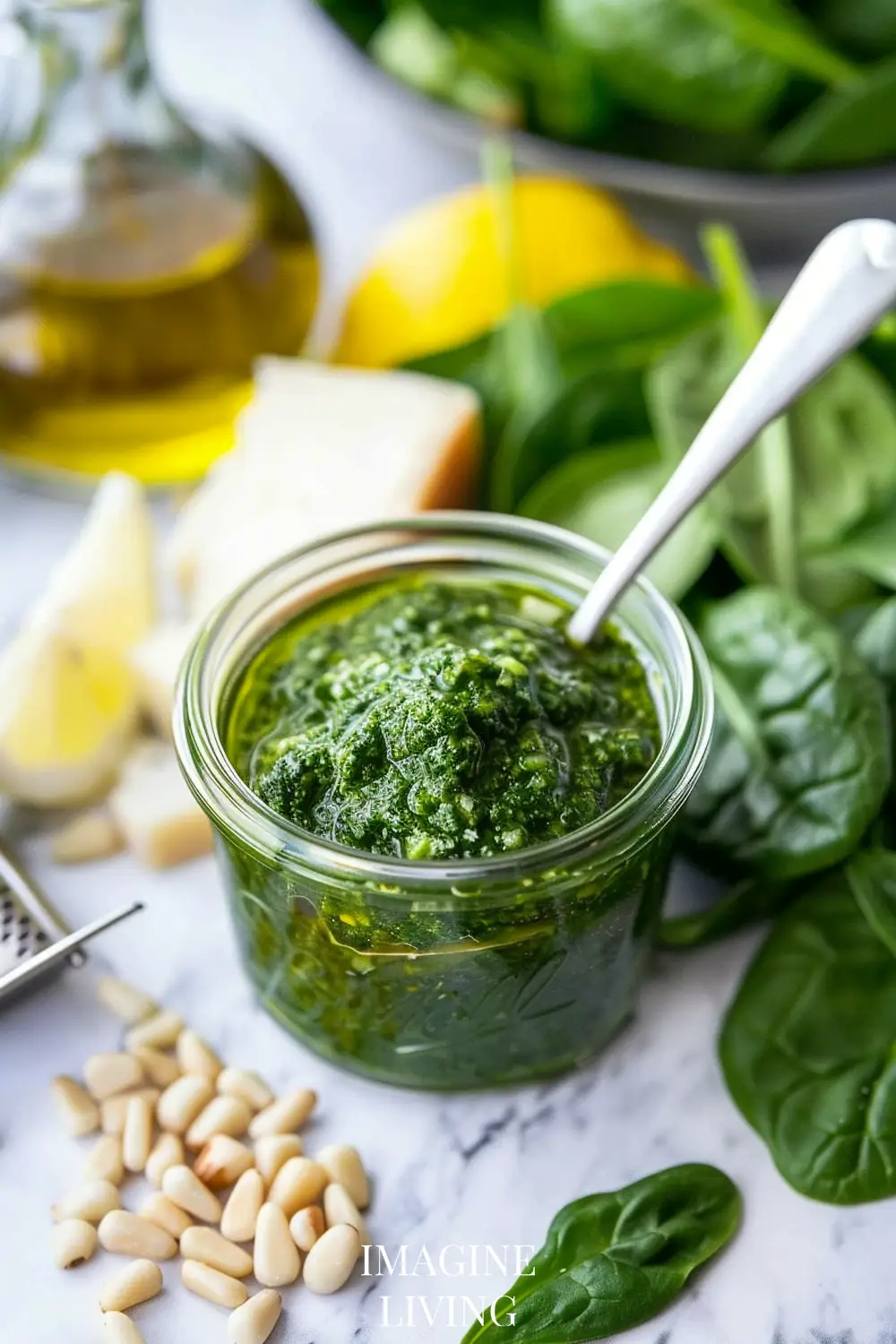
Why You’ll Love This Recipe
- Simple and quick – Ready in just 10 minutes with no cooking required.
- Versatile – Use it on pasta, bread, vegetables, or even as a marinade.
- Customizable – Adjust the ingredients to your taste and dietary preferences.
- Fresh and vibrant – Nothing beats the flavor of homemade pesto compared to store-bought versions.
Ingredients: A Perfect Blend for Fresh Basil Pesto
For the Pesto:
- 2 cups fresh basil leaves, packed
- 1/2 cup grated Parmesan cheese
- 1/3 cup extra virgin olive oil
- 1/3 cup pine nuts
- 2 cloves garlic, minced
- 1/2 teaspoon salt
- 1/4 teaspoon black pepper
- Juice of half a lemon (optional, for added freshness)
Equipment Needed
- Food processor or blender
- Measuring cups and spoons
- Spatula for scraping down the sides
Step-by-Step Guide to Making the Best Fresh Basil Pesto
Blend the Ingredients
In a food processor, combine basil leaves, Parmesan cheese, pine nuts, garlic, salt, and black pepper. Pulse several times until the mixture becomes finely chopped.
Tip: For a more robust flavor, lightly toast the pine nuts in a dry pan before blending.
Add the Olive Oil
With the food processor running, slowly drizzle in the olive oil. Blend until the pesto reaches a smooth consistency.
Tip: Adjust the olive oil amount based on your preferred consistency—thicker for spreading, thinner for drizzling.
Taste and Adjust
Taste your pesto and adjust seasoning as needed. If you like a tangy kick, add a squeeze of fresh lemon juice.
Tip: If the pesto is too thick, add a small splash of water to loosen it up.
“The secret ingredient is always love.”
Time Needed
- Prep Time: 10 minutes
- Total Time: 10 minutes
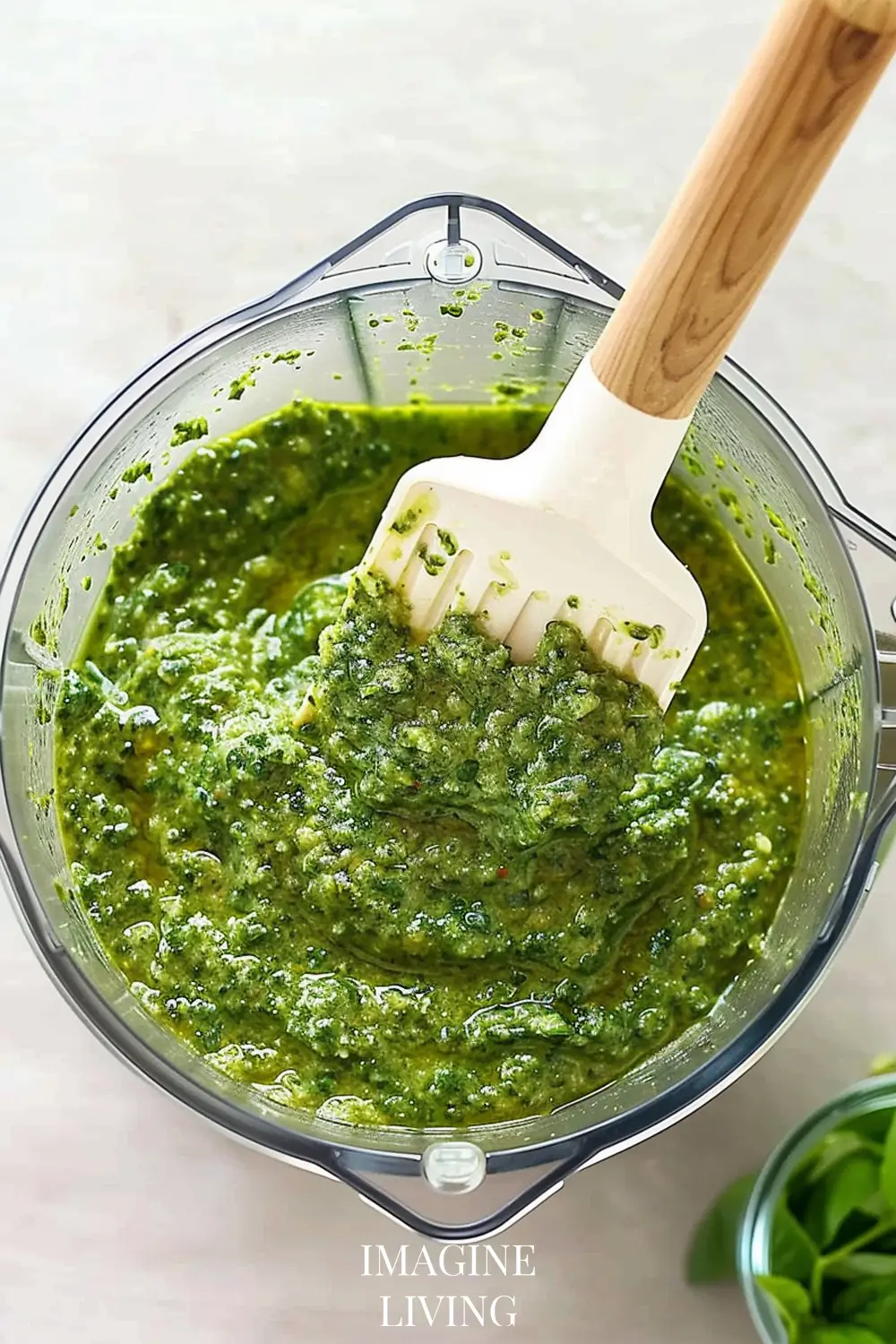
Pro Tips for the Best Homemade Basil Pesto
- Use the freshest basil possible for the most vibrant flavor.
- Toasting the pine nuts enhances their nutty taste and adds depth to the pesto.
- If your pesto turns out too bitter, add a pinch of sugar to balance the flavors.
- Store in an airtight container with a thin layer of olive oil on top to prevent browning.
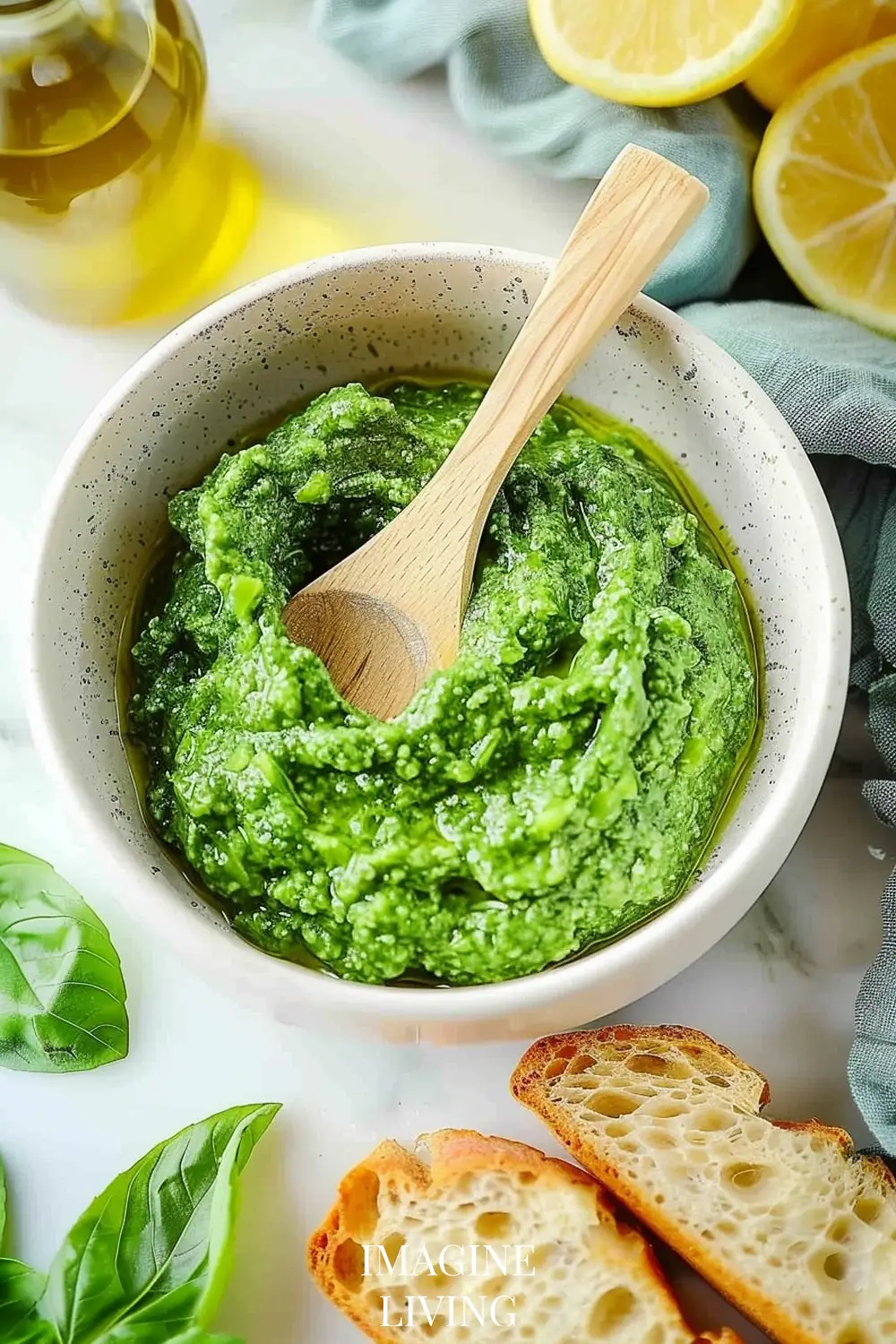
Creative Variations: Customize Your Basil Pesto
Nut-Free Pesto
Swap pine nuts with sunflower seeds or omit them entirely for an allergy-friendly version.
Tip: Pumpkin seeds work great and add a subtle earthy flavor.
Vegan Basil Pesto
Replace Parmesan with nutritional yeast for a dairy-free, vegan alternative.
Tip: Add a little extra lemon juice to balance the missing tang from Parmesan.
Spicy Basil Pesto
Add a pinch of red pepper flakes for a little heat.
Tip: Start with a small amount and adjust to taste!
Cilantro-Basil Pesto
Mix half basil and half cilantro for a unique flavor twist.
Tip: This pairs beautifully with tacos and grilled meats.
Walnut Pesto
Use walnuts instead of pine nuts for a slightly earthier taste.
Tip: Toasting the walnuts first will enhance their natural oils and flavor.
“Great cooking is about being inspired by the simple things around you.”
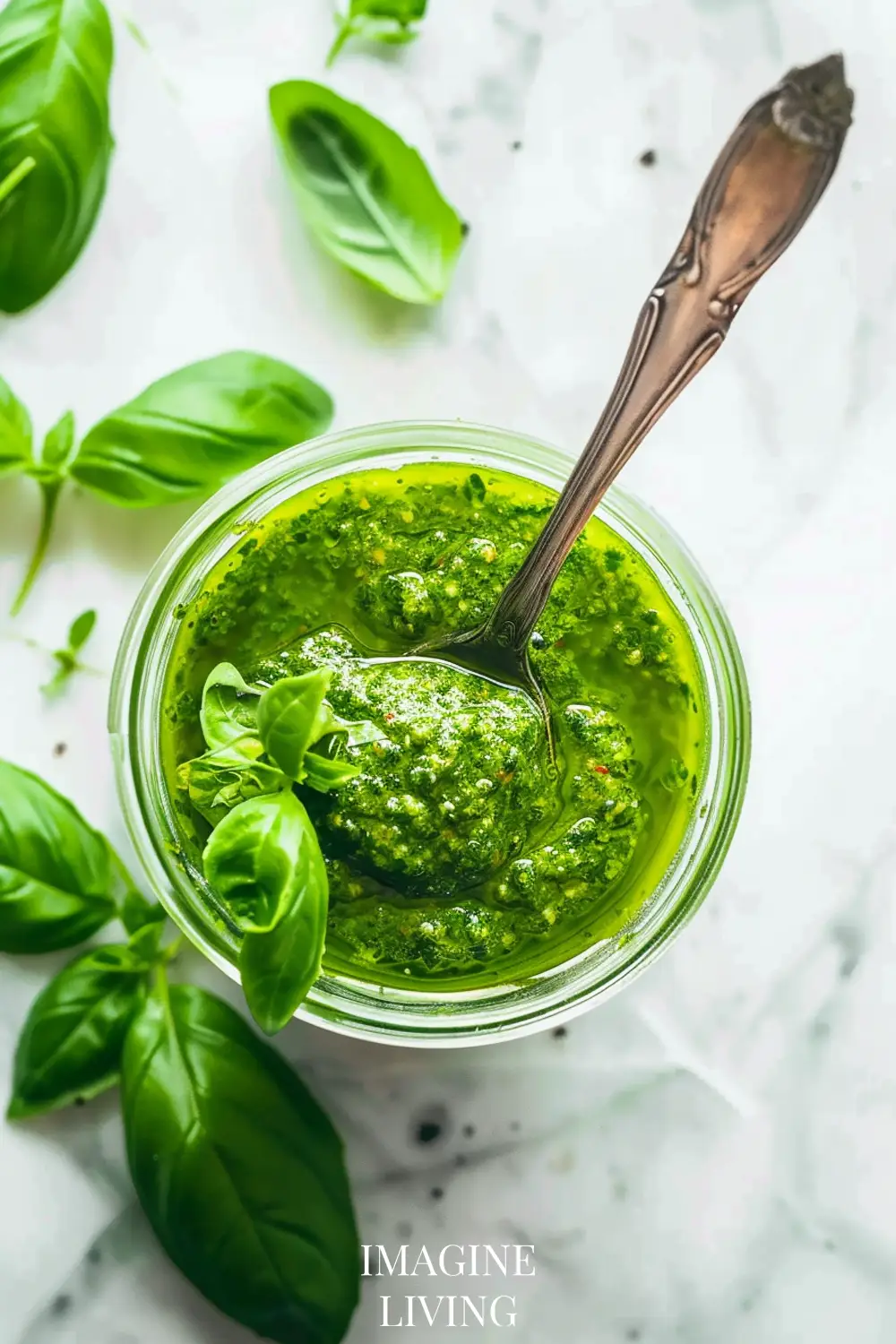
Serving Suggestions
- Toss with warm pasta for an easy meal.
- Spread on sandwiches or wraps for extra flavor.
- Drizzle over grilled vegetables for a fresh finish.
- Mix into mashed potatoes for a herby twist.
- Use as a dip for crusty bread or crackers.
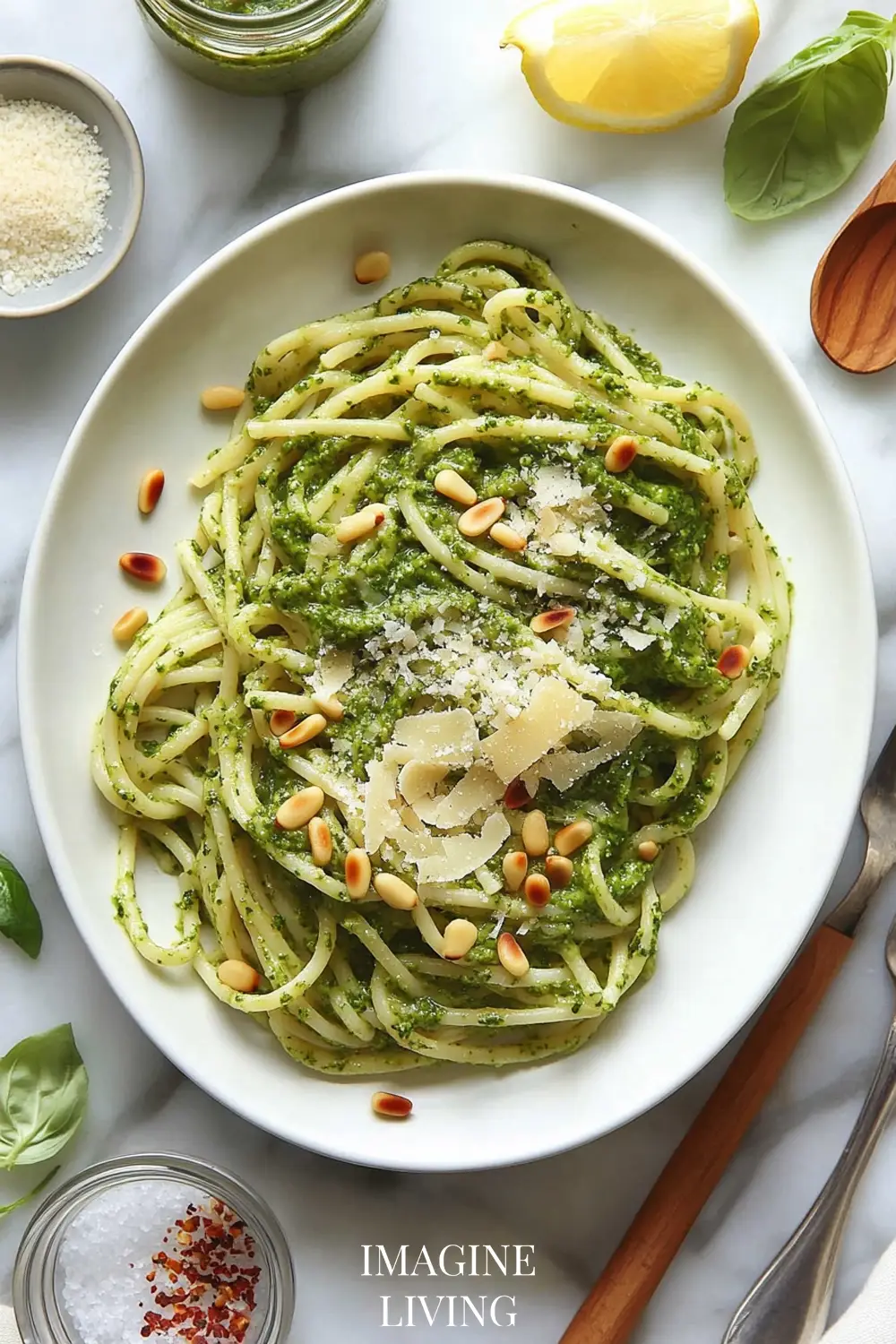

Storage and Reheating
- Refrigeration: Store in an airtight container in the fridge for up to one week.
- Freezing: Freeze in small portions (ice cube trays work well) for up to three months.
- Reheating: No need to reheat—just let it come to room temperature before using.
Common Mistakes to Avoid
Using Old Basil
Fresh basil is key. Wilted or old leaves can lead to a dull, bitter pesto.
Tip: If basil is slightly wilted, revive it by soaking in cold water for a few minutes.
Over-Blending
Too much blending can cause oxidation and darken the pesto.
Tip: Pulse the ingredients instead of running the blender continuously.
Adding All the Oil at Once
Slowly drizzling in the oil creates a better emulsion and texture.
Tip: This helps the pesto remain smooth rather than separating.
Skipping the Lemon Juice
Lemon juice prevents oxidation and keeps the pesto vibrant.
Tip: If not using lemon, store with a thin layer of olive oil to prevent browning.
Storing Incorrectly
Exposure to air can cause pesto to lose its bright green color.
Tip: Always store with a layer of olive oil on top to seal out air.

FAQs
Can I Make Pesto Without a Food Processor?
Yes! Use a mortar and pestle for a more traditional, rustic texture.
Tip: Crush ingredients in small batches for even consistency.
How Can I Fix Bitter Pesto?
Bitterness can come from old basil or over-processing.
Tip: Add a pinch of sugar or extra Parmesan to balance it out.
What’s the Best Oil for Pesto?
Extra virgin olive oil is the best choice for flavor and authenticity.
Tip: Avoid lower-quality oils, as they can taste too heavy or bitter.
Can I Freeze Pesto with Cheese?
Yes, but for best results, freeze without the cheese and add it fresh when using.
Tip: This maintains the best texture and flavor.
How Can I Make Pesto Last Longer?
Freeze in small portions and always store with a thin layer of olive oil on top.
Tip: Ice cube trays make portioning and thawing super easy!
The Fresh, Flavorful Joy of Homemade Pesto
Homemade fresh basil pesto is a simple yet incredibly flavorful addition to any dish. With just a handful of ingredients, you can create a sauce that transforms your meals with vibrant, herby goodness. Whether you stick to the classic recipe or get creative with variations, one thing is certain—once you make it from scratch, you’ll never go back to store-bought!
“Food tastes better when you make it with love.”
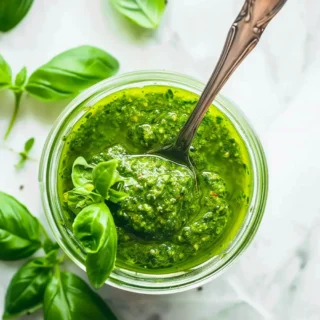
Fresh Basil Pesto Recipe
Equipment
- Food processor or blender
- Measuring cups and spoons
- Spatula
Ingredients
- 2 cups fresh basil leaves packed
- 1/2 cup grated Parmesan cheese
- 1/3 cup extra virgin olive oil
- 1/3 cup pine nuts
- 2 cloves garlic minced
- 1/2 teaspoon salt
- 1/4 teaspoon black pepper
- Juice of half a lemon optional
Instructions
- Blend the Ingredients: In a food processor, combine basil, Parmesan, pine nuts, garlic, salt, and black pepper. Pulse until finely chopped.Tip: Toast pine nuts in a dry pan for added depth of flavor.
- Add the Olive Oil: With the processor running, slowly drizzle in the olive oil until smooth.Tip: Adjust the oil for desired consistency—thicker for spreads, thinner for drizzling.
- Taste and Adjust: Add lemon juice for brightness, and adjust seasoning as needed.Tip: If too thick, mix in a small splash of water.




